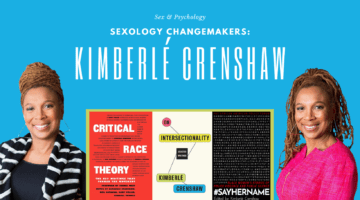How Sexual Attitudes and Behaviors Change as We Get Older
April 24, 2019 by Justin Lehmiller
Sex and aging is a topic that has been underexplored in sexuality research, given that the bulk of sex studies to date have focused on college students. However, we’ve learned more in the last few years, as online data collection and national surveys of sexual behavior have increased.
One study of sex and aging that recently caught my attention looked at how people’s sexual attitudes and behaviors change over the lifespan using data from a large and diverse sample of 1,522 adults from across the United States. The study was published in Evolutionary Behavioral Sciences and was led by researchers at UNLV and The Kinsey Institute. Participants ranged in age from 21-92 and all were currently single or casually dating.
Participants were asked how often they’d had sex in the previous year, what their ideal sexual frequency is, how sexually satisfied they are, as well as their openness to engaging in various sexual and relationship behaviors. Here are the key findings:
· Sexual frequency declined with age for both men and women—however, the decline was steeper for women than it was for men. Young men and women reported no differences in sexual frequency—it was only as people got older than a gender difference emerged, with women reporting less sex than men.
· This age-related decrease in sexual frequency coincided with a decrease in ideal sexual frequency. For example, people in their 30s said that their ideal would be 12 times per month; by contrast, people in their 70s and beyond put their ideal at 4 times per month. In other words, people in their 30s wanted three times as much sex as people aged 70+.
· Men’s ideal sexual frequency was higher than women’s—on average, they wanted sex about 2 times per month more than women across the lifespan.
· As men got older, sexual satisfaction didn’t change; by contrast, it increased for women. Also, it’s important to note that young men and women didn’t differ in sexual satisfaction, but older women were more sexually satisfied than older men.
· When asked about their willingness to engage in eight sexual and relationship behaviors (e.g., having a one-night stand, making a sex tape, getting married), younger adults expressed more willingness to engage in each of them than older adults. Also, men were more open than women to engaging in each of these behaviors, except for getting married, which women were more open to than men.
Of course, these data are limited by the fact that only people who were single or casually dating were surveyed, as well as the fact that people weren’t followed over time—in other words, this wasn’t a longitudinal study, which makes it difficult to know whether we’re talking about age-related effects or generation-related effects.
That said, these results offer insight into people’s sexual attitudes and behaviors at different stages of life. And while many of the results likely don’t come as a surprise, the sexual satisfaction findings are particularly intriguing because they tell us that while sexual frequency may decline with age, sexual satisfaction doesn’t necessarily drop with it. This provides further support for the idea that what makes sex satisfying seems to change as we age and that we likely come to place more emphasis on quality over quantity.
Want to learn more about Sex and Psychology? Click here for more from the blog or here to listen to the podcast. Follow Sex and Psychology on Facebook, Twitter (@JustinLehmiller), or Reddit to receive updates. You can also follow Dr. Lehmiller on YouTube and Instagram.
To learn more about this research, see: Gray, P. B., Garcia, J. R., & Gesselman, A. N. (2018). Age-related patterns in sexual behaviors and attitudes among single US Adults: An evolutionary approach. Evolutionary Behavioral Sciences.
Image Credit: 123RF/rawpixel
You Might Also Like:

Dr. Justin Lehmiller
Founder & Owner of Sex and PsychologyDr. Justin Lehmiller is a social psychologist and Research Fellow at The Kinsey Institute. He runs the Sex and Psychology blog and podcast and is author of the popular book Tell Me What You Want. Dr. Lehmiller is an award-winning educator, and a prolific researcher who has published more than 50 academic works.
Read full bio >


